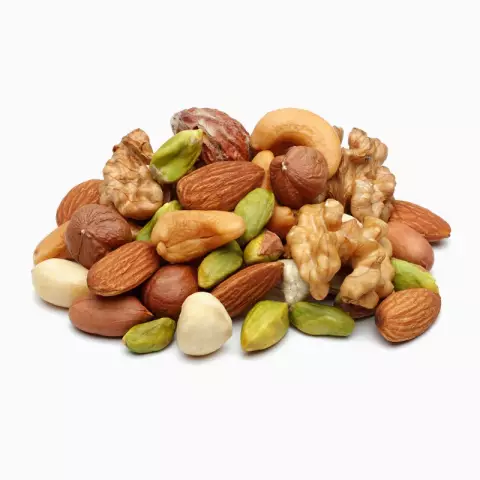- Author Rachel Wainwright wainwright@abchealthonline.com.
- Public 2023-12-15 07:39.
- Last modified 2025-11-02 20:14.
Ostrich egg
The African ostrich is the largest of all birds on Earth, producing the largest eggs weighing 1.2-2.2 kg.

The shell of an ostrich egg is smooth, penetrated with pores of various sizes and shapes. Egg shell weight is 220 grams, thickness - 1.83 mm. The color of the shell varies from white to light yellow and directly depends on the plumage of the bird. The ostrich egg has a large margin of safety and can withstand a load of up to 55 kg.
In general terms, an ostrich egg is close to a chicken egg in terms of lipid and protein composition. The color of its yolk is rich yellow, the white is almost transparent. Ostrich eggs cannot be obtained at any other time of the year, except for the summer: the female's productive season lasts from March to September-October. A good female ostrich lays 10-30 eggs during the breeding period, after which she pauses. Healthy ostriches remain productive for 20-30 years, which necessitates the purchase of this large bird as a multi-year investment.
The ostrich egg is a product with high commercial value, so almost every one of them is sent for incubation. Only unfertilized eggs of the early or late productive period become food products. In this regard, ostrich eggs are usually interested in restaurants offering ostrich egg omelet as an exotic dish or private consumers wishing to surprise their guests with an original appetizer for a gala evening.
The benefits of ostrich eggs
One ostrich egg weighing about 1.5 kg contains about 1 kg of protein and 320 g of yolk, which is an impressive portion of useful substances. Ostrich eggs are distinguished by good organoleptic characteristics: the content of vitamin A in the product is 19.5 μg / g, carotenoids - 36.6 μg / g, vitamin E - 116.5 μg / g. They surpass chicken ones not only in size, but also in the content of threonine and lysine - essential amino acids involved in building muscle protein and not synthesized by the body.
Along with the fact that an ostrich egg has a set of nutrients similar to that of a chicken: proteins, carbohydrates, fats, trace elements (potassium, calcium, phosphorus), the dietary value of the ostrich propagation product is several times higher. This is due to the low cholesterol content in the ostrich egg.
The calorie content of ostrich eggs is 160 kcal / 100 g.
Cooking ostrich eggs
Many ordinary people are interested in the answer to the question "how much to cook an ostrich egg." In order to boil a hard-boiled ostrich egg, it takes about 75 minutes, soft-boiled - 45 minutes. In some cases, the process of making an egg can be simplified by making a few small holes in its shell. With their help, the yolk of the egg will pour out and mix in the bowl.

The methods of cooking ostrich eggs are no different from the others - their contents are poured into the pan in the same way and used to prepare large portions of the dish. The finished ostrich egg omelet can be stored in the refrigerator for 2-3 days.
Despite the similarity to chicken eggs, ostrich eggs have a richer taste, which allows them to be used in baking, in order to give baked goods a more appetizing taste.
Usually culinary masterpieces of ostrich eggs are presented at special events: birthdays, anniversaries, Easter.
YouTube video related to the article:
Found a mistake in the text? Select it and press Ctrl + Enter.






